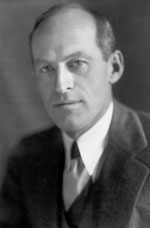Millard Tydings

Millard Evelyn Tydings (April 6, 1890–February 9, 1961) was an attorney, author, soldier, state legislator, and served as a Democratic Representative and Senator in the United States Congress from Maryland.
Early life
Tydings was born in Havre de Grace, located in Harford County. He attended the public schools of Harford County and graduated from Maryland Agricultural College (now the University of Maryland, College Park) in 1910. He engaged in civil engineering with the Baltimore and Ohio Railroad in West Virginia in 1911. He studied law at the University of Maryland School of Law, in Baltimore, and was admitted to the bar and commenced practice in Havre de Grace in 1913.
Tydings was elected to the Maryland House of Delegates in 1916, and was Speaker of the House from 1920-1922. He served in the Maryland State Senate during 1922-1923.
Tydings served in the U.S. Army during World War I and was promoted to Lieutenant Colonel and Division Machine-gun Officer in 1918. He served in Germany with the Army of Occupation and was discharged from the service in 1919.
House and Senate career
Tydings was elected as a Democrat to the 68th and 69th sessions of the U.S. Congress from the second district of Maryland (March 4, 1923-March 3, 1927), but was not a candidate for renomination in 1926, having become a candidate for the United States Senate. He was elected to the Senate in 1926, 1932, 1938 and 1944 and served from March 4, 1927, to January 3, 1951. He co-sponsored the Philippine Independence Act, commonly known as the Tydings-McDuffie Act, which established an autonomous 10-year Commonwealth status for The Philippines, which would then culminate in the withdrawal of American sovereignty and the recognition of Philippine Independence. In January 1934, Tydings introduced a resolution "condemning Nazi oppression of Jews in Germany, and asking President Roosevelt to inform the Hitler government that this country was profoundly distressed about its antisemitic measures... it remained bottled up in the Senate Foreign Relations Committee"[1]
In 1950, he headed a committee, generally known as the Tydings Committee to investigate the early claims of Joseph McCarthy and the penetration of the federal government and military by communism; specifically the hearings revolved around McCarthy’s charge that the fall of the Kuomintang regime in China had been caused by the actions of alleged Soviet spies in the State Department, and whether Sinologist Owen Lattimore was a “top Russian agent” as McCarthy claimed. The hearings held by the committee between March-July 1950 were extremely stormy as charge was met with counter-charge, and attracted much media attention, especially after Louis F. Budenz entered the proceedings as a surprise witness supporting McCarthy's charges. The committee published a report denouncing Joseph McCarthy and his claims as a hoax.
When Tydings ran for re-election in 1950, McCarthy's staff distributed a composite picture of Tydings with Earl Browder, the former leader of the American Communist Party, whom Tydings had never met before Browder testified before his committee in July 1950. The composite photo merged a 1938 photo of Tydings listening to the radio and a 1940 photo of Browder delivering a speech; the text under the composite photo stated that when Browder had testified before Tydings's committee, Tydings had stated in reply "Thank you, sir". Alhough the quote was technically accurate, it was generally held to be misleading as it implied a degree of amity between Browder and Tydings that did not in fact exist. Browder had been subpoenaed to appear before the committee and had been most reluctant to answer questions about allegations of Communist infiltration of the U.S. government. As a result, Tydings and Browder had clashed a number of times, and Tydings's thank-you remark had come after a lengthy exchange in which Browder had initially refused to answer a question about whether two diplomats had been members of the American Communist Party. In the 1950 election, Tydings was defeated by John Marshall Butler. He was again nominated in 1956 as Democratic candidate for the Senate, but withdrew before the election for health reasons.
During his congressional service, Tydings was chairman of the United States Senate Committee on Territorial and Insular Affairs (73rd through 79th Congresses), the Subcommittee on the Investigation of Loyalty of State Department Employees ("Tydings Subcommittee") (81st Congress), and the U.S. Senate Committee on Armed Services (81st Congress).
Notes
- ^ "Legitimating Nazism: Harvard University and the Hitler Regime, 1933–1937". American Jewish History 92.2 (2004) 189-223
Death and legacy
Millard E. Tydings died at his farm, "Oakington," near Havre de Grace, Maryland. He was buried in Angel Hill Cemetery.
Named in his honor, the Millard E. Tydings Memorial Bridge is located on the John F. Kennedy Memorial Highway. The bridge carries busy Interstate 95 across the Susquehanna River between high bluffs, as the river far below makes its way to nearby Havre de Grace, where it empties into the Chesapeake Bay. Also named in his honor is the Millard E. Tydings Hall at the University of Maryland, College Park, which houses the departments of Government & Politics and Economics.
His son, Joe Tydings, was also a Senator from Maryland from 1965-1971.
He is the grandfather of actress Alexandra Tydings.
Reference
- 1890 births
- 1961 deaths
- American military personnel of World War I
- Members of the Maryland House of Delegates
- Members of the United States House of Representatives from Maryland
- United States Army officers
- United States Senators from Maryland
- University of Maryland, Baltimore alumni
- University of Maryland, College Park alumni
- People from Harford County, Maryland
